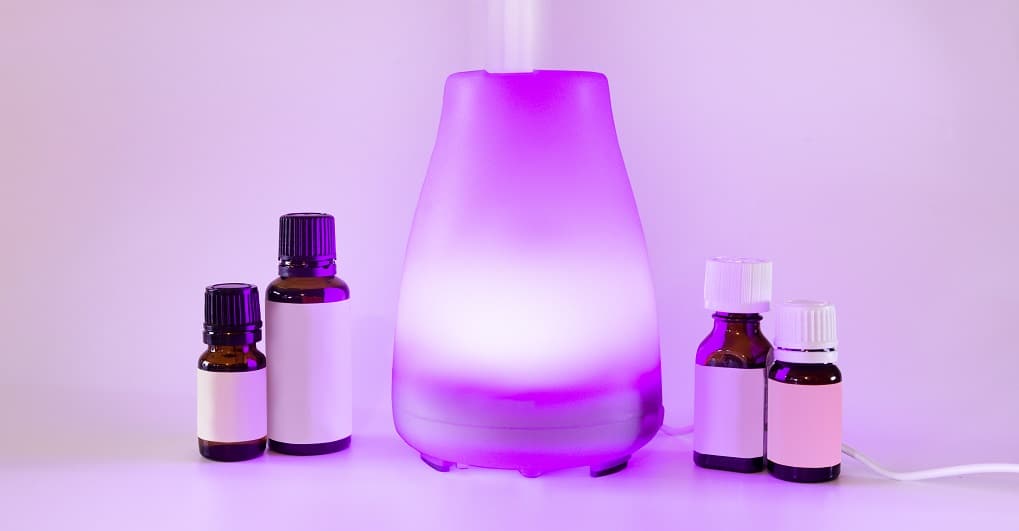Essential oils are an age-old remedy that people have used for centuries to treat a wide array of maladies. For example, stress relief, upset stomach, mood enhancement, and boosted immunity.
Whatever ailment you’re suffering from, there’s likely an essential oil that can fix it; even snoring.
In the most basic terms, essential oils are extracted chemical compounds from plants.
The term"‘essential" refers to the "essence" of the plant; the fragrance and flavor that comprise it. For example, lavender essential oil captures the aroma, scent, and taste of the lavender plant.
Essential oils are typically derived in two ways:
Essential oils are made from various parts of different types of plants; flowers, roots, leaves, or bark, for example.

Though there isn’t any definitive scientific evidence that supports the use of essential oils to help alleviate snoring; many naturopaths are proponents of their use as a remedy for the malady.
As a result, there are several different types of oils that may be used to help curb the effects of this sleep disturbance. The therapeutic use of essential oils is known as ‘aromatherapy’, and there are various ways that this therapy can be practiced.
Two of the most common methods include diffusing and topical application.
While essential oils can offer a myriad of benefits, it’s important that you practice safe use.
If you plan on using the oils topically, they must first be blended with a carrier oil; oils that dilute the plant oil and literally “carry” them onto the skin.
The reason: essential oils are powerful and as a result, if they are applied directly to the skin, they can cause irritation.
There are several different types of oils that can be used as carrier oils; examples include coconut, olive, almond, argan, avocado, and grape seed. Ensure the oil you choose is both natural and unscented.
Everyone reacts differently to different products. You should first test the carrier oil before using it your aromatherapy practice. To test, place a small amount of the oil on the underside of your wrist, cover it with a bandage and allow to sit for 24 hours.
When you remove the bandage, if the skin is irritated, rinse the affected area and stop using the oil.
If you know you suffer from allergies – like a nut allergy, for example – do not use a tree nut oil (argan or sweet almond, for example).
The suggested dilution guidelines are as follows (add these amounts to ever 6 teaspoons of carrier oil):
Simply mix the essential oil with the carrier based on the dilution criteria above and apply to the skin
Never ingest essential oils. While high-quality essential oils are safe to inhale and apply topically (when diluted with a carrier oil), when ingested, they can be poisonous(1).
Additionally, make sure that the essential oils you use come from reputable sources. Always research companies and the products ingredient list before using.
Below are several essential oils that can be used for snoring.

Thyme is known for its flavor and is often used in cooking; however, it also offers medicinal qualities(2). Thyme contains thymol, a natural compound that is an antiseptic in nature and is believed to strengthen the respiratory response(3).
To use thyme essential oil, mix it with a carrier oil and apply it to the soles of your feet before bedtime. There are points on the bottom of the feet – particularly the big toes – that can relax the muscles in the neck.
Given that thyme may support the respiratory system, applying the oil to the bottom of your feet may help to ease snoring.
Alternatively, you can fill a diffuser with thyme oil. Start the thyme-infused diffuser about 30 minutes before bedtime to allow the aroma to fully permeate the space.

The compounds found in eucalyptus act as a decongestant, as they help to open the airways and can break up mucus that gets trapped within the respiratory system. It’s often used to treat symptoms that are associated with the common cold, bronchitis, and even asthma(4).
The most effective way to use this essential oil is via steam inhalation:
Alternatively, you can mix eucalyptus with a carrier oil and apply it to your chest and around your nose before bedtime, or simply mix a few drops into a diffuser in your bedroom and inhale it while you’re sleeping.

A highly aromatic herb that belongs to the mint family (a blend of watermint and spearmint), peppermint oil is used to treat a variety of ailments, including digestive health issues, such as irritable bowel syndrome (IBS) and upset stomach, as well as headaches and congestion(5).
Menthol is the primary compound in peppermint oil, an analgesic that can clear out the sinuses and ease congestion.
To use peppermint oil as a snoring aid, dilute it with a carrier oil and apply it to your chest, around the back of your neck, and underneath your nose.
You can also try steam inhalation by applying a few drops to hot water and breathing in the vapor. You can also diffuse it in your sleeping space.

Perhaps one of the most well known essential oils, lavender oil has been used for centuries to treat a wide range of ailments. The chemical compounds that lavender contains are anti-inflammatory and antiseptic in nature(6).
It’s often used to treat anxiety, depression, restlessness, upset stomach, and fungal infections. It also helps to promote relaxation and may be able to reduce congestion.
Lavender has a sweet, floral, fresh scent that most people find very pleasing (which is why it’s often used in soaps, cosmetics, lotions, and room fresheners).
Place a few drops of lavender oil on your pillow before going to sleep or diffuse it in your bedroom so you can inhale the aroma. Not only can it help to reduce snoring, but it also creates a sense of calm that may help to achieve more restful sleep.

Native to Mediterranean regions, fennel is a perennial herb that is often used as a flavoring agent for food.
The chemical compounds found in fennel seeds are said to treat everything from digestive issues and menstrual cramps. It also helps to alleviate respiratory tract issues, as it can thin out mucus and ease congestion(7).
Fennel has a spicy scent, a blend between pepper and licorice.
As with other essential oils that are mentioned on this list, to use fennel as a snoring aid, diffuse it in the room where intend to sleep. In turn you'll take advantage of the anti-inflammatory effects, which may help to minimize inflammation within the nasal passages. You can also mix a few drops in hot water and breathe in the steam vapor before going to bed.

Lemon is a citrus fruit that is known for its pungent, yet refreshing flavor. Lemon essential oil is derived from lemon peels. The chemical compounds in the peels of this fruit offer anti-inflammatory effects(8) that have been shown to offer a number of positive health benefits.
It can help to reduce depression and anxiety, boosts the mood, and creates an uplifting, yet relaxing feeling; plus, it offers a pleasant fresh scent that many find appealing.
Breathing in lemon oil can help to calm nasal congestion by easing mucus buildup, as well as relax the muscles within the throat.
Steam inhalation via a diffuser or by simply mixing it with a hot water and breathing it in is said to be the most effective way to use lemon essential oil.

Myrrh essential oil is derived from the sap of the Commiphora Myrrha tree. The chemical compounds within the sap of this tree offers anti-inflammatory properties(9).
It can also be used as an expectorant and an astringent. Additionally, myrrh is known to have a positive effect on the mood, as many people report that it creates an uplifting sensation. Because of the anti-inflammatory and expectorant effects, this essential oil is said to be an excellent way to relieve snoring naturally.
Mix myrrh oil with a carrier oil and apply it to your chest and underneath your nose before bedtime. Doing so can help to alleviate decongestion that contributes to snoring. As with all the other oils, you can also diffuse it.
Snoring can be more than just a nuisance; it can prevent you and your sleeping partner from getting much-needed rest. If you or someone you love suffer from snoring, try using any of the above-mentioned essential oils as a natural remedy.
Not only is there a good chance that they will reduce snoring, but you can also take advantage of the numerous other benefits that these oils provide and enjoy deeper, more restful sleep.
1. https://onlinelibrary.wiley.com/
3. https://www.ncbi.nlm.nih.gov/
5. https://www.ncbi.nlm.nih.gov/
6. https://www.ncbi.nlm.nih.gov/

Snoringsource.com is a participant in the Amazon Services LLC Associates Program, an affiliate advertising program designed to provide a means for website owners to earn advertising fees by advertising and linking to amazon(.com, .co.uk, .ca etc) and any other website that may be affiliated with Amazon Service LLC Associates Program.